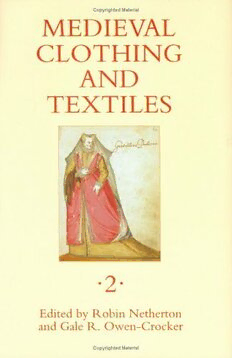
Medieval Clothing and Textiles 2 PDF
206 Pages·2006·7.616 MB·English
Most books are stored in the elastic cloud where traffic is expensive. For this reason, we have a limit on daily download.
Preview Medieval Clothing and Textiles 2
Description:
Historical dress and textiles, always a topic of popular interest, has in recent years become an academic subject in its own right, transcending traditional genre boundaries. This annual journal includes in-depth studies from a variety of disciplines as well as cross-genre scholarship, representing such fields as social history, economics, history of techniques and technology, art history, archaeology, literature, and language. The contents cover a broad geographical scope and a range of periods from the early Middle Ages to the Renaissance.Papers in this latest volume discuss clothing descriptions in an early Irish poem in relation to archaeological finds; the Latin inscription embroidered on the Bayeux Tapestry; clothmaking in twelfth-century French romances; medieval Paris as an international textile market; the cost of sartorial excess in England as attested by sumptuary laws and satire; textile cleaning techniques at a German convent in the fifteenth century; the use of jewelled animal pelts as fashion accessories in the Renaissance; and the social significance of the embroidered jacket in early modern England. Also included are reviews of recent books on dress and textile topics.ROBIN NETHERTON's research focuses on medieval Western European clothing and its interpretation by artists and historians; GALE R. OWEN-CROCKER is Professor of Anglo-Saxon Culture, The University of Manchester. Her most recent books are Dress in Anglo-Saxon England (2004), and King Harold II and the Bayeux Tapestry (2005).
See more
The list of books you might like
Most books are stored in the elastic cloud where traffic is expensive. For this reason, we have a limit on daily download.
